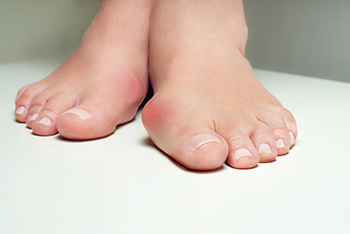
Bunions are bony bumps that form at the base of the big toe, often caused by a misalignment of the toe joint. This condition leads to the big toe angling toward the other toes, creating an uncomfortable and noticeable protrusion. Common symptoms include pain, swelling, and difficulty wearing certain shoes. Bunions can result from genetic factors, excessive foot stress, or wearing ill-fitting shoes. Treatment for bunions focuses on managing pain and slowing progression. Initially, this involves wearing properly fitting shoes with a wide toe box and using orthotic inserts to reduce pressure. Taking anti-inflammatory medications can help with discomfort. In more severe cases, where conservative measures fail, surgical options may be considered to realign the toe and correct the deformity. If you're experiencing symptoms of a bunion or need advice on managing foot discomfort, it is suggested you make an appointment with a podiatrist who can provide expert care and tailor treatment to your specific needs.
If you are suffering from bunion pain, contact Jim Maxka, DPM of South Penn Foot & Ankle Associates. Our doctor can provide the care you need to keep you pain-free and on your feet.
What Is a Bunion?
Bunions are painful bony bumps that usually develop on the inside of the foot at the joint of the big toe. As the deformity increases over time, it may become painful to walk and wear shoes. Women are more likely to exacerbate existing bunions since they often wear tight, narrow shoes that shift their toes together. Bunion pain can be relieved by wearing wider shoes with enough room for the toes.
Causes
- Genetics – some people inherit feet that are more prone to bunion development
- Inflammatory Conditions - rheumatoid arthritis and polio may cause bunion development
Symptoms
- Redness and inflammation
- Pain and tenderness
- Callus or corns on the bump
- Restricted motion in the big toe
In order to diagnose your bunion, your podiatrist may ask about your medical history, symptoms, and general health. Your doctor might also order an x-ray to take a closer look at your feet. Nonsurgical treatment options include orthotics, padding, icing, changes in footwear, and medication. If nonsurgical treatments don’t alleviate your bunion pain, surgery may be necessary.
If you have any questions, please feel free to contact our office located in Hanover, PA . We offer the newest diagnostic and treatment technologies for all your foot care needs.
